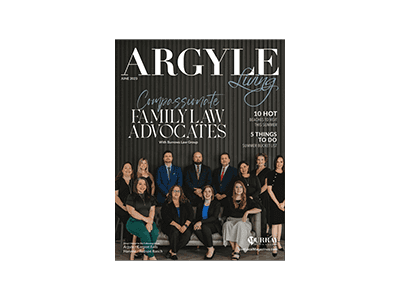




Lewisville Child Custody Attorney
Advocating for What You Know Is Best for Your Child
Two people divorce generally because they cannot see eye-to-eye on important marital issues. It's really no surprise when one of those areas of disagreement is how the children should be raised.
Disputes over child custody are common in divorce. At Burrows Law Group, our child custody attorneys in Lewisville understand the stress these arguments place on the entire family. Our compassionate and focused representation aims to bring this issue to a resolution that supports the child's best interests.
Contact our Lewisville child custody lawyer by calling (972) 236-7798 today!
Types of Custody (Conservatorship) in Texas
The legal term for custody in the Lone Star State is conservatorship. As a matter of public policy, the state has three goals: assuring the children have frequent and continuing contact with both parents (unless deemed unsafe); providing a safe, stable, and nonviolent environment for the child; and encouraging parents to share in the rights and duties of raising their children.
There are three basic types of conservatorship (custody) in Texas.
Sole Managing Conservatorship (SMC)
This is similar to what other states often call full legal custody. When a parent is granted SMC, that parent has the authority to make all decisions regarding the child. SMC gives the right to choose where the child lives and what school they attend. This parent can determine what religion, if any, the child follows. Medical decisions like surgeries and vaccines are determined by this parent.
In applying for SMC, a parent must present compelling reasons why such an arrangement would be in the child's best interest. Courts carefully evaluate each parent's ability to provide for the child's emotional, educational, and health needs before making a determination.
Joint Managing Conservatorship (JMC)
In a joint managing conservatorship, both parents share the rights and duties of decision-making for their children. The court prefers granting JMC because it gives both parents equal footing in the lives of their children. It should be noted that even in JMC, the court can choose to grant one parent the decision-making power for where the child lives.
Joint decision-making can foster a cooperative environment, encouraging parents to work together for the child's welfare. However, successful JMC arrangements depend on the parents' ability to communicate effectively and make joint decisions in good faith.
Possessory Conservatorship (PC)
Possessory conservatorship is the equivalent of visitation. A parent with PC will be given consistent and frequent parenting time with their children. While they don’t have the legal authority to make decisions, they do legally have access to their children’s medical records and school records. They can also attend their children’s athletic games, artistic recitals, and so forth. They can also consent to emergency medical attention when the child is with them.
Possessory conservators must adhere to the schedule stipulated by the court, which ensures the child maintains regular contact with them. This involvement is crucial in sustaining the parent-child relationship post-divorce.
Best Interest of the Child in Lewisville
In previous decades, the “tender years doctrine” was used here and in states across the U.S. This legal principle favored the mother as the children’s primary caretaker. Unless evidence showed that the mother was unfit, moms were presumed to be awarded custody in divorce. That has changed in Texas and elsewhere in the country.
In 1995, the “best interest of the child” was added to Texas law to be the official guiding legal presumption. The court considers the qualifications of both parents without regard to their gender.
The factors considered in determining the best interest of the child include the following:
- The child’s age and physical and mental vulnerabilities
Young children or those with health concerns require special consideration to ensure their physical and emotional needs are met. - The child’s emotional and physical needs
The court assesses the ability of each parent to attend to the child's educational, emotional, and social development. - Each parent’s living situation
The stability and safety of each parent’s home are crucial to determining where a child should reside. - The willingness of the parents to support each other’s relationship with the child
Facilitating a positive relationship with the other parent is a key factor in promoting the child's well-being. - The relationship the child had with each parent prior to the divorce
Existing dynamics often play a significant role in determining future living arrangements. - Each parent’s level of stability
Economic, emotional, and psychological stability are evaluated to determine parental capability. - The child’s preferences (usually age 12 or older)
When appropriate, a child's own wishes are considered, especially if they are mature enough to make an informed decision. - The support system of each parent
The availability of extended family, friends, and community resources is assessed to ensure a nurturing environment for the child.
Any history of domestic violence or substance abuse will be highly scrutinized by the court, as these factors carry heavy implications for the child's safety and well-being.
Child Custody Litigation & Negotiation in Lewisville
Divorcing parties have the right to take their grievances before a judge, but that’s not a requirement. Child custody disagreements can often be resolved through negotiation. At Burrows Law Group, our custody lawyers in Lewisville have extensive experience in navigating both negotiations and divorce court.
Alternative dispute resolution methods like mediation can also aid in reaching amicable agreements, reducing the emotional and financial costs of litigation. Mediation focuses on collaborative decision-making, allowing parents to have a direct role in crafting a parenting plan that fits their unique circumstances.
Negotiated child custody agreements are presented to a judge for approval. After the court’s endorsement, the negotiated agreement carries the same weight and enforceability as one determined by a judge.
If an agreement is violated, the court can take multiple actions including suspending the offender's driving or professional license, denying them their passports, placing a lien on property and accounts, and even ordering civil or criminal contempt of court.
How Burrows Law Group Can Assist with Custody Challenges
At Burrows Law Group, we understand that every child custody case is unique, and our team of experienced child custody attorneys Lewisville provides personalized legal support tailored to your specific circumstances. We work collaboratively with you to explore all legal options, whether through negotiation or court intervention, to ensure that your parental rights and your child’s best interests are safeguarded.
Our commitment to client education means we take the time to explain complex legal terms, processes, and potential outcomes so that you are fully informed throughout the entire process. This comprehensive approach ensures that the choices you make are in full support of your overall goals and the well-being of your children.
Frequently Asked Questions About Child Custody in Lewisville
How Do Lewisville Courts Determine Child Custody?
Texas family courts, including those in Lewisville, prioritize the best interests of the child when determining custody arrangements. This principle guides every decision made by the court. To this end, the court evaluates factors such as each parent's emotional connection with the child, their respective ability to provide a stable environment, and their willingness to support the child’s relationship with the other parent.
The child's preferences may also be considered if the court deems the child mature enough to express a well-reasoned opinion, usually around the age of 12 or older. Moreover, any evidence of domestic violence or substance abuse will be heavily scrutinized as it impacts parental capability and the child’s safety. In all scenarios, the goal is to align the custodial arrangement with enhancing the child’s overall well-being.
Can a Child Custody Order Be Modified in Lewisville?
In Lewisville, modifications to child custody orders are permissible when there is a substantial change in circumstances affecting the child’s welfare. Parents seeking modifications must present new evidence or situations that justify altering the existing order. Examples include significant shifts in a parent's ability to care for the child, changes in living conditions, or the child’s expressed desire for a different living arrangement.
As with initial custody decisions, the court will consider whether any proposed modifications align with the child’s best interests. This process requires careful documentation and often the support of legal representation to effectively argue your position. Being proactive and transparent about any changes in circumstances can facilitate a smoother modification process.
What Role Does Mediation Play in Child Custody Cases?
Mediation serves as an alternative dispute resolution method frequently utilized in Lewisville child custody cases. It offers a platform for parents to engage in open dialogue, facilitated by a neutral third party, aimed at reaching mutual agreements without resorting to litigation. Mediation can help reduce conflict and create more customized parenting plans that reflect the unique needs of the child and family dynamics.
Many family courts, including those in Lewisville, encourage mediation as it can significantly decrease the emotional and financial burdens associated with custody disputes. Should couples reach a satisfactory agreement during mediation, the resulting plan is submitted to the court for approval and subsequent enforcement, carrying the same legal weight as a court verdict.
What Can I Do if the Other Parent Violates Our Custody Agreement?
If a custody agreement is not being honored by the other parent, several legal remedies are available. Initially, you may seek clarity or mediation to address any misunderstandings or unintentional breaches. However, persistent violations may necessitate court intervention. Filing a complaint in family court can lead the judge to enforce the original agreement or issue new orders to prevent future breaches.
Courts in Lewisville take violations seriously and have mechanisms like contempt of court, fines, or modification of existing orders to uphold compliance. Keeping a detailed record of all infractions, such as dates and descriptions of violations, is critical. This documentation will support your case in court and ensure that the best interests of your child remain the foremost priority.
If you have questions about child custody in Lewisville, contact us for more information. We offer consultations. Schedule by calling (972) 236-7798.
An Experienced Team
You Can Trust
-
 Adam Burrows Managing Attorney, President & CEO
Adam Burrows Managing Attorney, President & CEO- Family Law,
- Child Custody,
- Divorce,
- Modifications,
- Prenuptial Agreements,
- Property Division,
- Restraining Orders,
- Same Sex Marriage,
- Small Business Formation
-
 Dr. Jessica Burrows In-house Counselor & CFO
Dr. Jessica Burrows In-house Counselor & CFO -
 Daniel Dower Senior Associate Attorney
Daniel Dower Senior Associate Attorney- Family Law,
- Child Custody,
- Divorce,
- Modifications,
- Prenuptial Agreements,
- Property Division,
- Restraining Orders,
- Same Sex Marriage,
- Small Business Formation
-
 Jennifer Hicks Senior Attorney
Jennifer Hicks Senior Attorney- Family Law,
- Child Custody,
- Divorce,
- Modifications,
- Prenuptial Agreements,
- Property Division,
- Restraining Orders,
- Same Sex Marriage
-
 Brielle Roderick-Badoy Senior Associate Attorney
Brielle Roderick-Badoy Senior Associate Attorney- Family Law,
- Child Custody,
- Divorce,
- Modifications,
- Prenuptial Agreements,
- Property Division,
- Restraining Orders,
- Same Sex Marriage
-
 Hollie Ritchie Associate Attorney
Hollie Ritchie Associate Attorney- Family Law,
- Estate Planning,
- Child Custody,
- Divorce,
- Modifications,
- Prenuptial Agreements,
- Property Division,
- Restraining Orders,
- Same Sex Marriage
-
 Vanita Aphan-Kirkland Senior Attorney
Vanita Aphan-Kirkland Senior Attorney- Family Law,
- Child Custody,
- Divorce,
- Modifications,
- Prenuptial Agreements,
- Property Division,
- Restraining Orders,
- Same Sex Marriage
-
 Dale A. Burrows Founder & Of-Counsel
Dale A. Burrows Founder & Of-Counsel- Family Law
-
 Melissa Ruden Board Certified Paralegal
Melissa Ruden Board Certified Paralegal -
 Lily Lord Senior Paralegal
Lily Lord Senior Paralegal -
 Madison Duehr Senior Paralegal
Madison Duehr Senior Paralegal -
 Christian Mathis Firm Administrator & Intake Specialist
Christian Mathis Firm Administrator & Intake Specialist -
 Jennifer Mulford Administrative Assistant & Billing Coordinator
Jennifer Mulford Administrative Assistant & Billing Coordinator
.2509041016024.png)
.2509041014128.png)




































